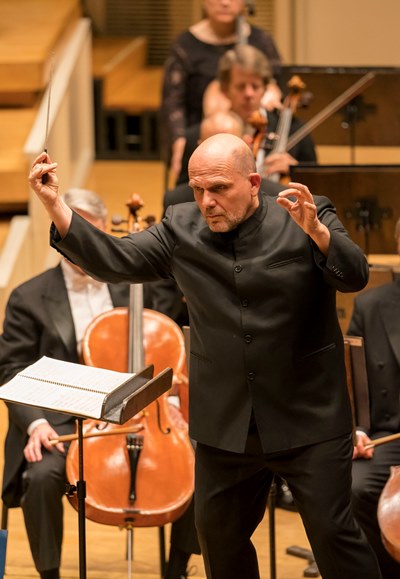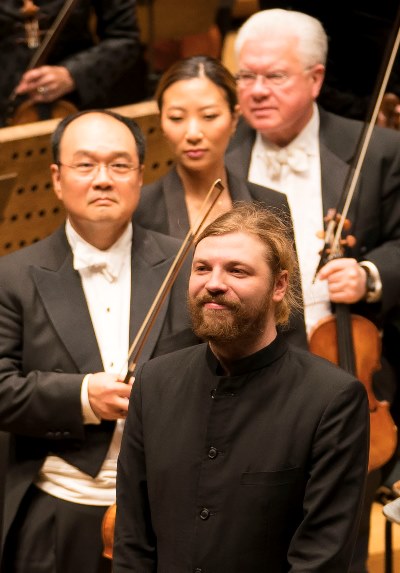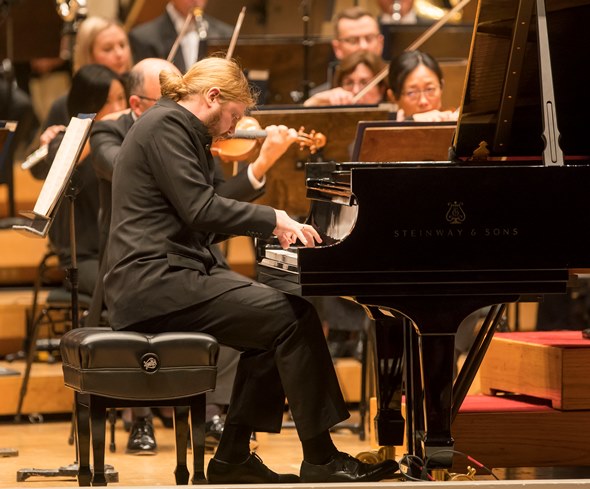In Rachmaninoff concerto, Denis Kozhukhin embodies glittering wave of Russian pianists
Review: Chicago Symphony Orchestra conducted by Jaap van Zweden; Denis Kozhukhin, piano. At Orchestra Hall thru Dec. 19.
By Lawrence B. Johnson
Pianist Denis Kozhukhin’s imposing and poetic turn through Rachmaninoff’s Second Piano Concerto, with the Chicago Symphony Orchestra and conductor Jaap van Zweden on Dec. 16, drove home a striking reality about today’s pianistic landscape: It is dominated by a clutch of Russians in their forties or younger.
 At age 31, Kozhukhin is eclipsed only by 26-year-old Daniil Trifonov in terms of youth among the half-dozen Russian or Russian-born pianists whose every appearance at Orchestra Hall warrants any needed adjustment in one’s personal schedule in order to be there.
At age 31, Kozhukhin is eclipsed only by 26-year-old Daniil Trifonov in terms of youth among the half-dozen Russian or Russian-born pianists whose every appearance at Orchestra Hall warrants any needed adjustment in one’s personal schedule in order to be there.
Those two comparative youths are part of a gang of six that represent the new-wave standard in piano virtuosity. Rounding out that electric cadre are the Russian-born Evgeny Kissin, 46, who now holds dual British and Israeli citizenship; Nikolai Lugansky, 45; Denis Matsuev, 42, and the Russian-born Kirill Gerstein, 38, who is now an American citizen.
What these pianists share is superb schooling, consummate technique and penetrating musical intelligence. It’s both an intellectual and aesthetic pleasure to hear any of them play; moreover, they are all quite engaging as artists of distinctive temperament. Kozhukhin’s Rachmaninoff was effectively a showcase of what makes these Russians so captivating.
Along with the formidable strength required of the Second Piano Concerto, which Rachmaninoff wrote with his own large hands and limitless means in mind, Kozhukhin also displayed the agility, elegance and lyric sensibility that together raise this concerto from histrionic exercise to epic poem.
Still, it is a concerto and much of the mesmerizing effect stemmed from the close collaboration between pianist and conductor – the spinning of an orchestral tapestry into which Kozhukhin’s sound and gesture were profoundly woven. The work’s expansive slow movement shone in the fluid exchanges between keyboard and the CSO’s principal winds. The finale surged with symphonic energy and coloristic display, the solo pianist rivaling the orchestra’s collective potency on both counts.
 This grand enterprise done, Kozhukhin returned to the stage for a quiescent encore: Brahms’ Intermezzo Op. 117, No. 1, a gentle lullaby that unfolded with disarming tenderness and simplicity.
This grand enterprise done, Kozhukhin returned to the stage for a quiescent encore: Brahms’ Intermezzo Op. 117, No. 1, a gentle lullaby that unfolded with disarming tenderness and simplicity.
Van Zweden, who officially becomes music director of the New York Philharmonic in September, complemented Rachmaninoff’s ever-popular concerto with another perennial Russian chart-topper: Tchaikovsky’s Symphony No. 5 in E minor. If that pairing seemed calculated to pack ‘em into Orchestra Hall – well, it succeeded. Those two masterpieces are favorites, generation after generation, for good reasons; they’re also tailor-made for the Chicago Symphony’s all-around virtuosity.
If there was a defining feature of van Zweden’s approach to the ultra-familiar Tchaikovsky Fifth, it was restraint. This thoroughly Romantic music possesses its own thoroughgoing brilliance, and van Zweden allowed its richly hued textures to unfurl as if by internal necessity. Even when he let the tempo fly, in the finale’s closing pages, that surge seemed as inevitable as it was electrifying.
The CSO delivered a scintillating performance, but also one of fetching grace and fluency. The enduring charms of the Fifth Symphony lie equally in its shadows and its sunlight. This performance, from the strings dark radiance to the woodwinds dancing liquidity and the brasses’ gleaming fanfares, took the music’s full measure.
Van Zweden prefaced his Russian fare with Wagner’s Prelude to Act I of “Lohengrin,” in a shimmering account that showed the Chicago strings at their luxurious best.
Related Link:
- Performance and ticket info: Details at CSO.org
Tags: Daniil Trifonov, Denis Kozhukhin, Denis Matsuev, Evgeny Kissin, Jaap van Zweden, Kirill Gerstein, Nikolai Lugansky


